Branding is no longer a secondary concern, it’s a strategic asset. With increasingly crowded markets and digital attention spans getting shorter, companies need more than good products. They need trust. And that trust begins with a cohesive brand experience that signals credibility, competence, and confidence.
A strong brand shortens decision-making, clarifies positioning, and drives better recall across touchpoints. Branding agencies understand these dynamics deeply, creating values and identities that resonate in rational and emotional contexts.
And to anchor that in some real numbers, did you know that 76% of consumers are more likely to buy from a brand they feel emotionally connected to, even if similar alternatives exist? That emotional layer often overlooked in performance metrics ant it's precisely what a great branding agency brings into focus.
Branding agencies offer more than a logo or a color palette. They guide the whole arc of the brand narrative—from market research and brand messaging to logo design, digital experiences, and visual identity systems. Their role is to help companies build brand strategies rooted in long-term relevance, creating brands that feel real in every interaction.
Our Branding Agency Evaluation System
We understand that ranking top branding agencies requires a rigorous, objective approach that goes beyond simply reviewing portfolios. To ensure the highest level of reliability and relevance for our readers, we have developed proprietary evaluation system grounded in criteria that directly reflect agency quality, accountability, and long-term client success.
Our scorecard distills agency performance into four laconical criteria, each scored out of 5. These points address the fundamental questions a client should ask about an agency's ability to deliver a scalable, legally sound, and strategically validated brand:
| Criteria | What it measures? | Why it matters? |
|---|---|---|
| Proprietary Methodology | The sophistication of the agency's strategic foundation. | An agency with a named, proprietary strategic framework demonstrates deep expertise and a repeatable process that isn't dependent on one individual. This predictability reduces risk and ensures thorough research, differentiating it from agencies that follow only generic "discover, design, deploy" steps. |
| Strategy Validation | The agency's commitment to proving its strategy with data before executing design. | High-scoring agencies integrate quantitative testing, stakeholder alignment workshops, or data-driven consumer validation before moving into expensive creative execution. This step proves the strategy will resonate, dramatically increasing the trustworthiness and effectiveness of the final brand. |
| Deliverable Clarity | The completeness, scalability, and legal clarity of the final assets. | High score is awarded when the agency explicitly confirms the client retains full intellectual property (IP) ownership and provides comprehensive guidelines covering visual, verbal, and behavioral identity. This legal clarity and complete instruction set protects the client's future business and ensures the brand can be maintained and enforced. |
| Post-Launch Support | The agency’s commitment to the brand’s health after the initial launch. | A top-tier agency views the launch as a starting point. By offering defined post-launch support, training, or a brand monitoring framework, they build trust and ensure the brand is adopted correctly, measured effectively, and adapted for long-term success, rather than simply handing over assets and ending the engagement. |
By focusing on these process-based criteria, our system minimizes subjective judgment of creative aesthetics. Instead, we rely on verifiable evidence found in public documentation, case studies, and industry reporting.
Top Branding Agencies Worldwide - December 2026
1. Ramotion
Ramotion is a branding agency that connects identity, user experience, and development into cohesive brand experiences. Known for partnering with high-growth startups and tech-forward companies, Ramotion focuses on creating brands that resonate across every touchpoint—aesthetically and strategically. Ramotion can ensure consistency across platforms and teams with a process-led, multidisciplinary approach.
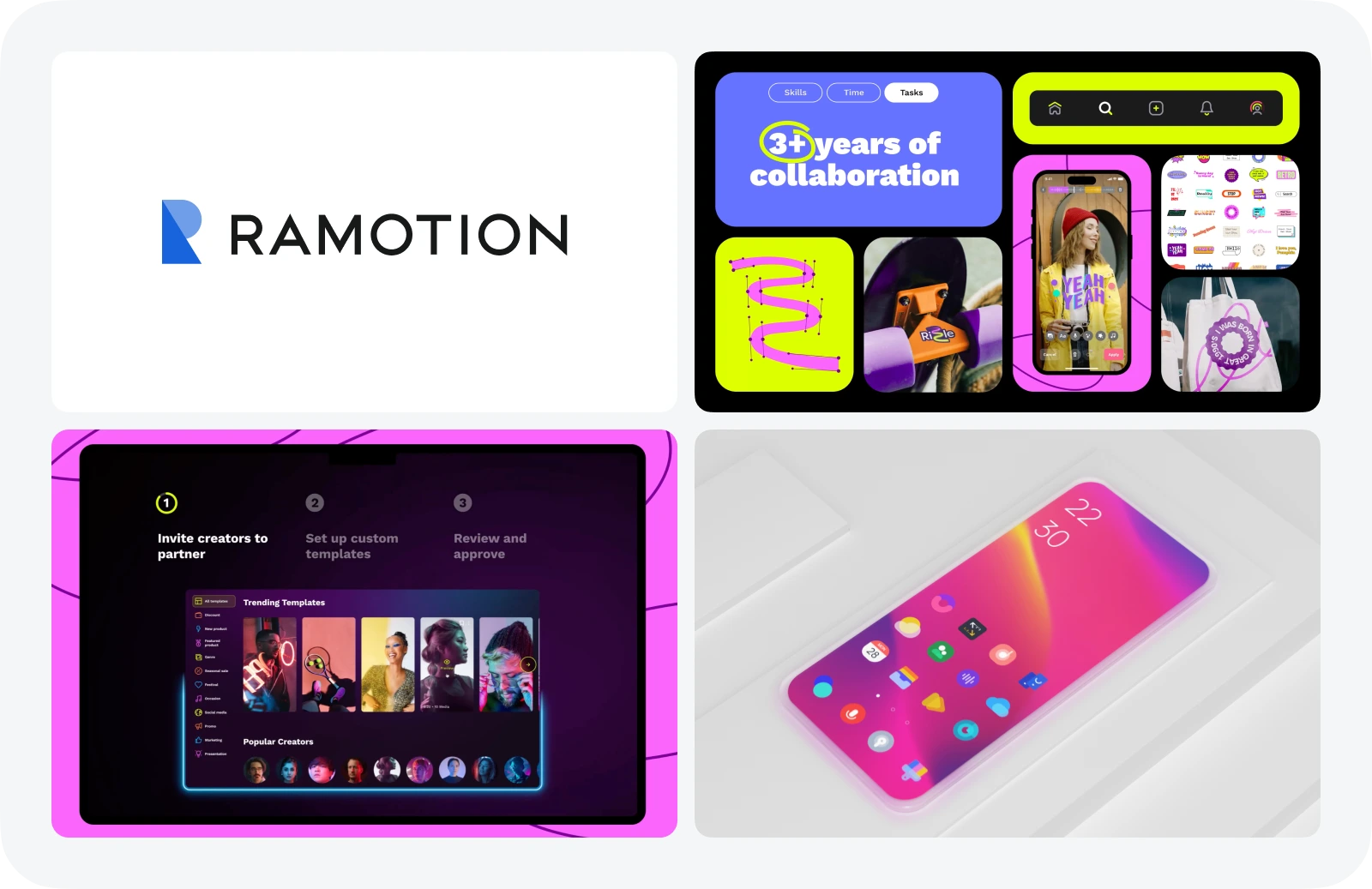
Limiting their client roster allows Ramotion to stay deeply involved in every project. The team balances logic with imagination, resulting in brand identities that are scalable, intuitive, and impactful. Whether brand strategy, logo design, or product UI, Ramotion delivers clarity and elegance with every pixel.
| Location(s) | San Francisco (CA, USA) |
| Founded | 2009 |
| Team Size | 10–49 |
| Clients | Startups, SMBs |
| Services | Branding, UI/UX Design, Web Development, Mobile Apps |
| Budgets | $50,000+ |
| Industries | Technology, Education, Finance, Healthcare |
| Website | ramotion.com |
| Social Links | LinkedIn, Twitter |
- Best for: High-growth B2B, SaaS, FinTech, and Cybersecurity brands needing a strategic, digital-first identity and scalable design system.
- Downside: Can have a higher price point (reflecting high-end projects); some reviewers note their focus is primarily on the design/product end.
- Portfolio: Digital identities, including product design and UI/UX systems. (Explicit client names like Stripe and Firefox often mentioned in testimonials/reviews).
- Strengths: Highly creative, responsive, and collaborative team; exceptional at delivering high-quality design under tight deadlines.
- Unique Offering: A structured 6-phase process from Immersion & Discovery to Ongoing Support, emphasizing implementation & onboarding resources for consistent brand application.
2. Wolff Olins
Wolff Olins is a global brand consultancy renowned for creating transformative brands that drive business, culture, and experience forward. Founded in 1965 in London, the agency has pioneered the branding industry. It is known for its bold and unconventional approach—its philosophy centers on uniting brand, culture, and experience to ignite positive change and defy convention.
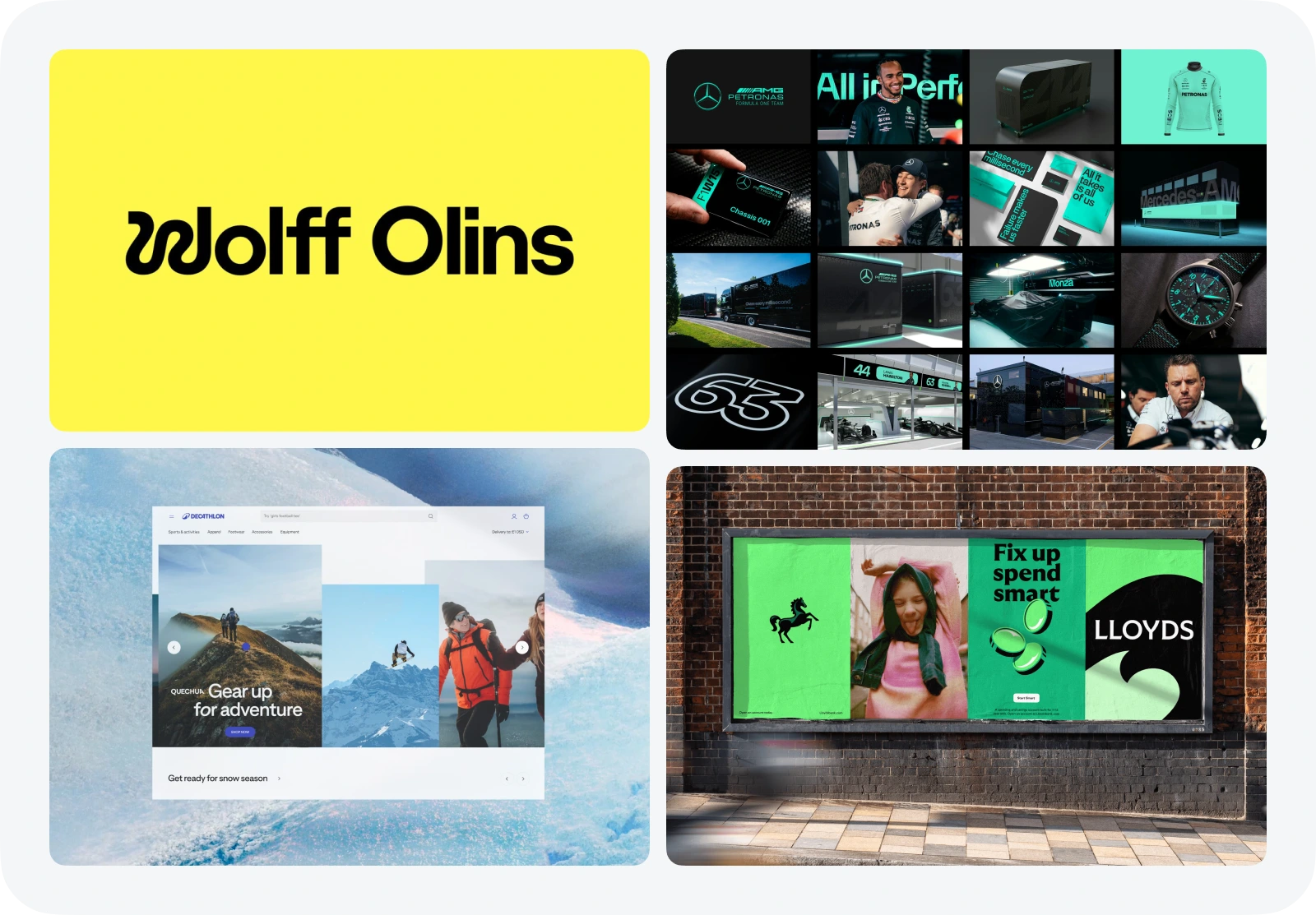
With offices in London, New York, San Francisco, and Los Angeles, Wolff Olins has collaborated with a vast range of clients, including Uber, Google, TikTok, GSK, and The Metropolitan Museum of Art. Their services include brand strategy, visual and verbal identity, architecture, and experience design.
| Location(s) | London (UK), New York City (NY), San Francisco (CA, USA) |
| Founded | 1965 |
| Team Size | 150+ |
| Clients | Enterprises, Non-profits |
| Services | Brand Strategy, Visual Identity, Verbal Identity, Brand Architecture, Experience Design |
| Budgets | $10,000+ |
| Industries | Technology, Culture, Media, Retail, Non-profit |
| Website | wolffolins.com |
| Social Links | LinkedIn, Twitter, Instagram |
- Best for: Global organizations and large companies seeking total brand, culture, and experience transformation to drive business performance.
- Downside: Typically requires a high budget and a significant time commitment; their deep-level process may be overwhelming for smaller organizations.
- Portfolio: Landmark global transformations (e.g., GE, Microsoft Windows, Tate, London Olympics 2012).
- Strengths: Fuses strategy (maths) and creativity (magic) to unite brand, culture, and experience; strong focus on internal culture and employee value proposition.
- Unique Offering: Holistic Approach that addresses Brand, Culture, and Experience simultaneously, viewing the brand as a "catalyst for change" to supercharge transformation efforts.
3. Landor
Landor is a global leader in brand transformation and identity design. They specialize in brand management for multinational companies navigating complexity, mergers, and reinvention. Landor brings deep understanding to strategy and execution — from naming and brand guidelines to scalable systems that drive long-term business success.
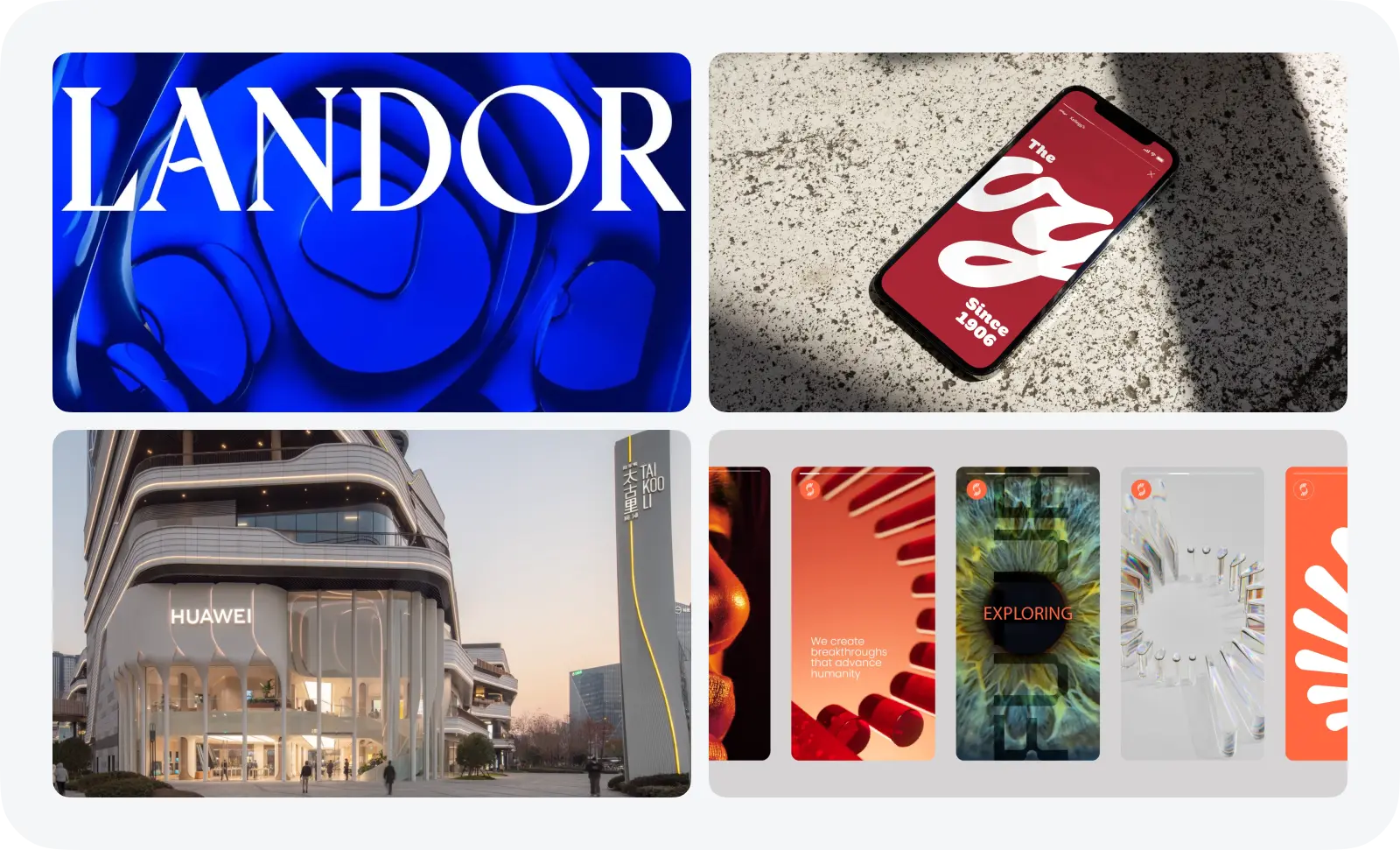
They combine research, analytics, and creativity to build brand strategies that thrive across industries and cultures. Their ability to deliver cohesive brand experiences across all platforms makes them a trusted branding partner to some of the world’s largest companies.
| Location(s) | San Francisco (CA, USA) + 31 Offices Worldwide |
| Founded | 1941 |
| Team Size | 1,300+ |
| Clients | SMBs, Enterprise |
| Services | Brand Strategy, Brand Design, Brand Experience |
| Budgets | Undisclosed |
| Industries | Consumer Goods, Technology, Education |
| Website | landor.com |
| Social Links |
- Best for: Large-scale, global entities needing comprehensive brand architecture and identities that work seamlessly across physical and digital platforms.
- Downside: High cost associated with a major global consultancy; processes can be strategy-heavy, sometimes prioritizing analytics over radical creative risk.
- Portfolio: Iconic, enduring global brands and transport: FedEx, BP, Coca-Cola's Visual Identity, City of Melbourne.
- Strengths: Balance of Strategy and Creativity, with solutions grounded in research; commitment to human-centric design and versatility across physical, digital, and environmental design.
- Unique Offering: Pioneers of Modern Branding (founded 1941) who integrated consumer feedback (focus groups, interviews) and teamwork (crit sessions) into the design process early on.
4. Pentagram
Pentagram is a renowned creative agency and collective of independent partners, each leading their team. The firm is famous for its timeless identity design and strategic thinking across architecture, editorial, and digital. Pentagram is known for bold, enduring work that defines cultural and commercial eras.
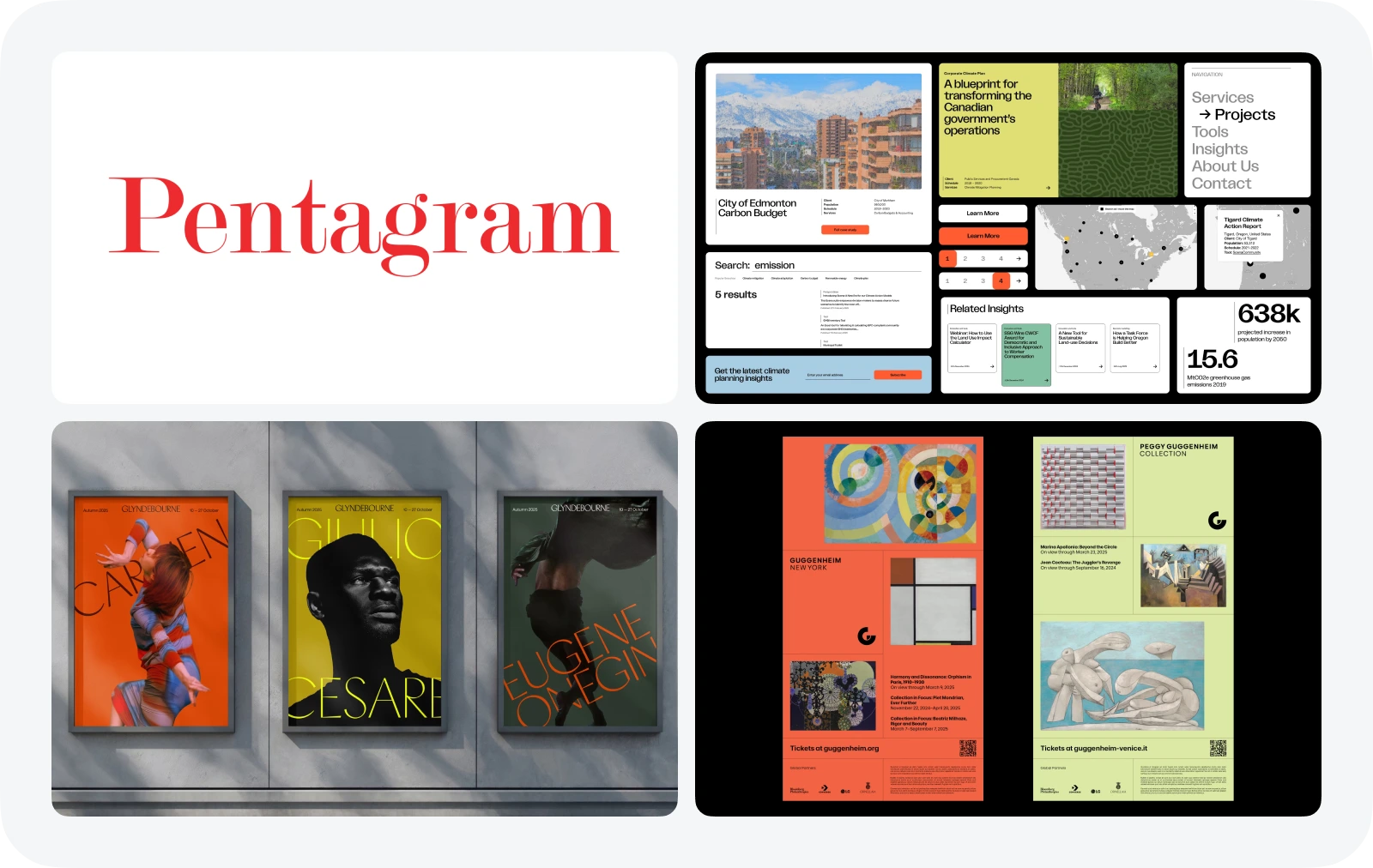
Each branding project at Pentagram is led by a partner, meaning clients get direct access to top-tier creative minds. The result is identities that resonate, speak clearly, and last for decades. Their client roster spans public institutions to startups aiming to disrupt.
| Location(s) | London (UK), New York City (NY), Austin (TX, USA) |
| Founded | 1972 |
| Team Size | 100–249 |
| Clients | SMBs, Enterprise |
| Services | Brand Strategy, Messaging, Graphic Design, Digital Design |
| Budgets | $5,000+ |
| Industries | Arts & Entertainment, Consumer Goods, Finance |
| Website | pentagram.com |
| Social Links | LinkedIn, Twitter |
- Best for: Clients seeking iconic, high-craft, and enduring visual identity across graphics, packaging, websites, and physical installations.
- Downside: Non-traditional structure (client contacts a partner); focus is often on high-end design craft, and projects may lack the quantitative business metrics of a consultancy.
- Portfolio: Encompasses graphics, identity, products, packaging, and digital experiences across five decades and many industries.
- Strengths: The world's most acclaimed creative collective; the owners of the business are the creators of the work and serve as the primary client contact.
- Unique Offering: Partner-led Structure: A flat hierarchy where partners own the business, manage their own teams and clients, and collaborate based on personal commitment and passion.
5. Motto
Motto is a strategic branding agency that partners with visionary leaders to create brands that inspire and drive change. Led by co-founders Sunny Bonnell and Ashleigh Hansberger, Motto specializes in brand creation and transformation, helping companies articulate their purpose and build cohesive brand experiences
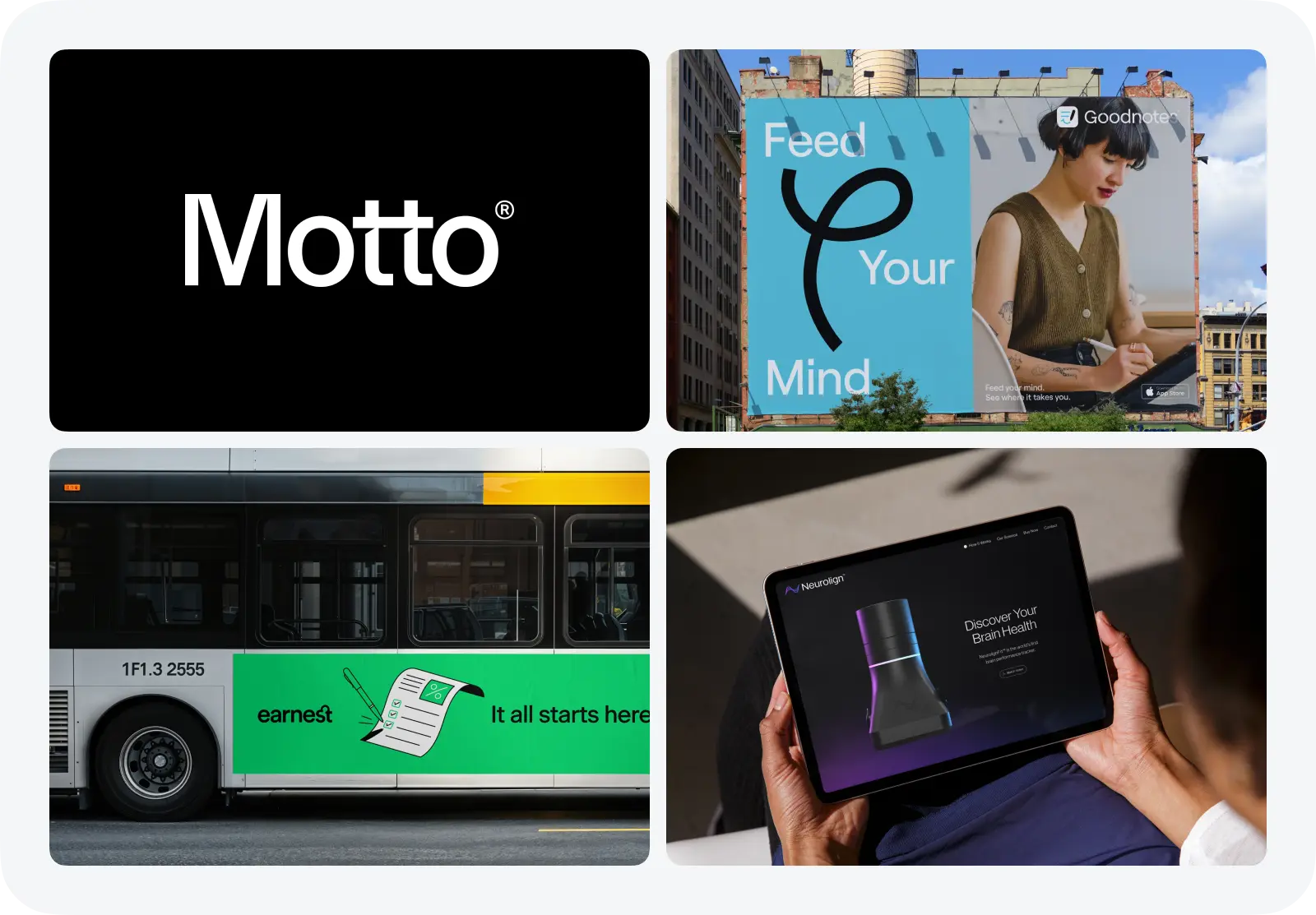
Their approach centers around developing "Ideas Worth Rallying Around," uniting teams and audiences under a shared vision. With a focus on innovation and culture, Motto has worked with diverse clients, from startups to established enterprises, to craft brands that resonate deeply and stand out in competitive markets.
| Location(s) | New York City (NY), Dallas (TX, USA) |
| Founded | 2005 |
| Team Size | 11-50 |
| Clients | Startups, Enterprises |
| Services | Brand Strategy, Brand Identity, Brand Culture |
| Budgets | $75,000+ |
| Industries | Finance,Technology, Consumer Goods, Education |
| Website | wearemotto.com |
| Social Links | LinkedIn, Twitter |
- Best for: Innovative companies in the tech and innovation space needing support in company positioning, category definition, and brand expression.
- Downside: Highly focused on strategy and narrative; may require separate resources for large-scale marketing or development rollouts.
- Portfolio: Tech-focused companies like Klaviyo, Cresta (Enterprise AI), Nomina (onchain era), and organizations like the Minnesota Vikings.
- Strengths: Sharp creative thinking balanced with operational rigor; exceptional at uniting leadership under a common vision.
- Unique Offering: Ideas Worth Rallying Around®: A trademarked concept where they align a company's entire business around a central, unifying idea (the Brand Motto).
6. Snøhetta
Snøhetta is an internationally renowned branding and design firm integrating architecture, landscape, interior, product, and graphic design. With offices in Oslo and New York, they approach branding as an extension of spatial and cultural narratives, creating visually compelling and contextually meaningful identities.
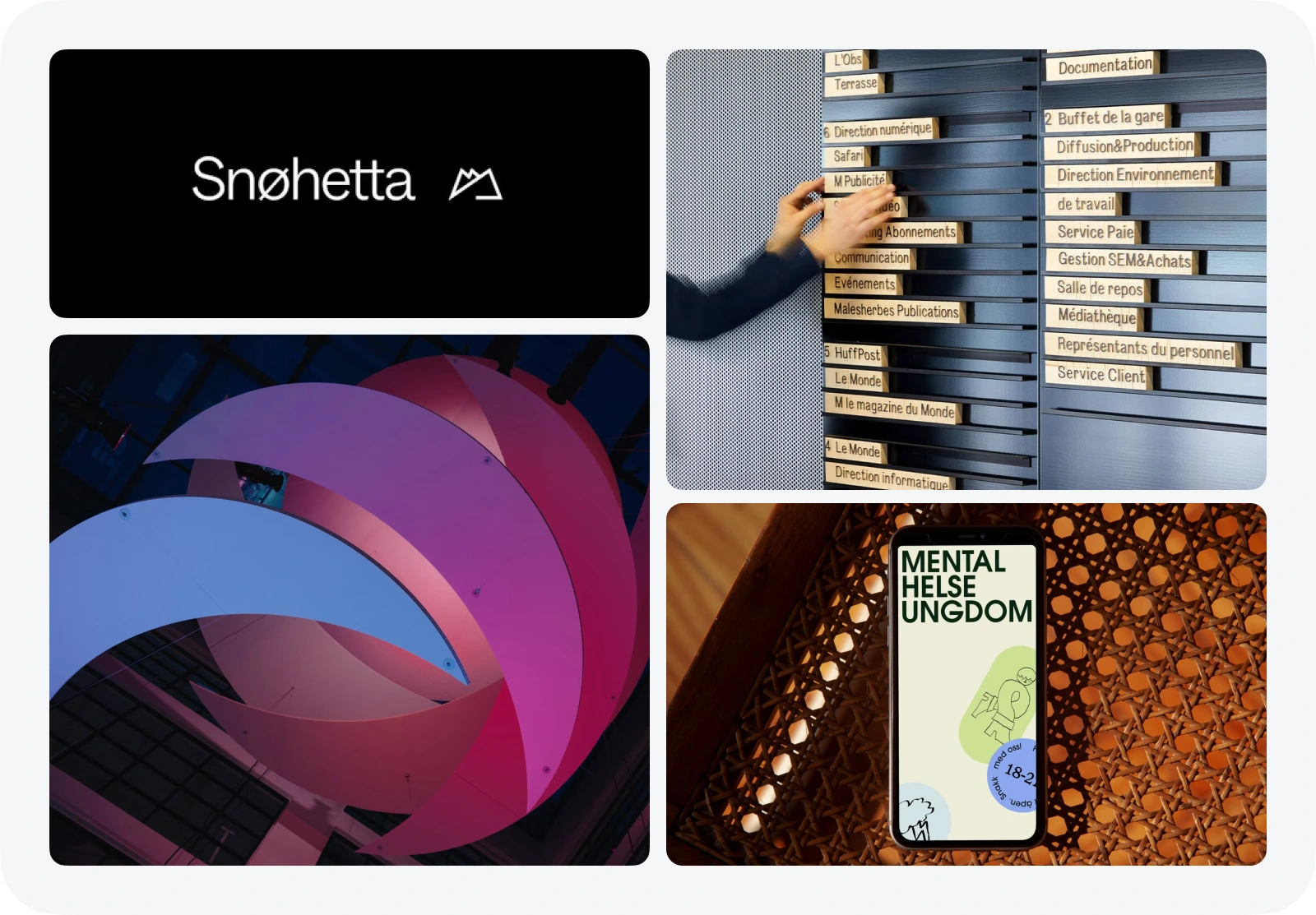
Their branding work is characterized by a holistic perspective, ensuring that every touchpoint—from logos to physical spaces—contributes to a unified brand experience. Snøhetta creates aesthetically pleasing brands deeply rooted in storytelling and user engagement by blending disciplines.
| Location(s) | Oslo (NO), New York City (NY, USA) |
| Founded | 1989 |
| Team Size | 50–249 |
| Clients | SMBs, Enterprises |
| Services | Branding, Graphic Design, Architecture, Interior Design |
| Budgets | Undisclosed |
| Industries | Arts & Culture, Public Spaces, Corporate |
| Website | snohetta.com/ |
| Social Links | LinkedIn, Instagram |
- Best for: Brands requiring meaningful, holistic connections where the brand strategy must inform and align with physical spaces, environments, or cultural projects.
- Downside: Their trans-disciplinary approach can make projects long and complex due to the number of integrated fields (architecture, brand, landscape).
- Portfolio: Public and Cultural institution branding, Wayfinding & Signage, Digital & Web Design, often in collaboration with their renowned architectural projects.
- Strengths: Multidisciplinary approach and strong creative management, rejecting fixed styles to craft strong narratives where context and ambition lead.
- Unique Offering: Fusing Disciplines: The design of Brand & Experience Design alongside Architecture and Landscape architecture for truly holistic output.
7. Porto Rocha
Porto Rocha is a Brooklyn-based branding agency that specializes in identity systems with attitude. They work with purpose-driven companies to build bold, clear, and unforgettable brands. Their design language is modern, expressive, and unafraid to challenge norms.
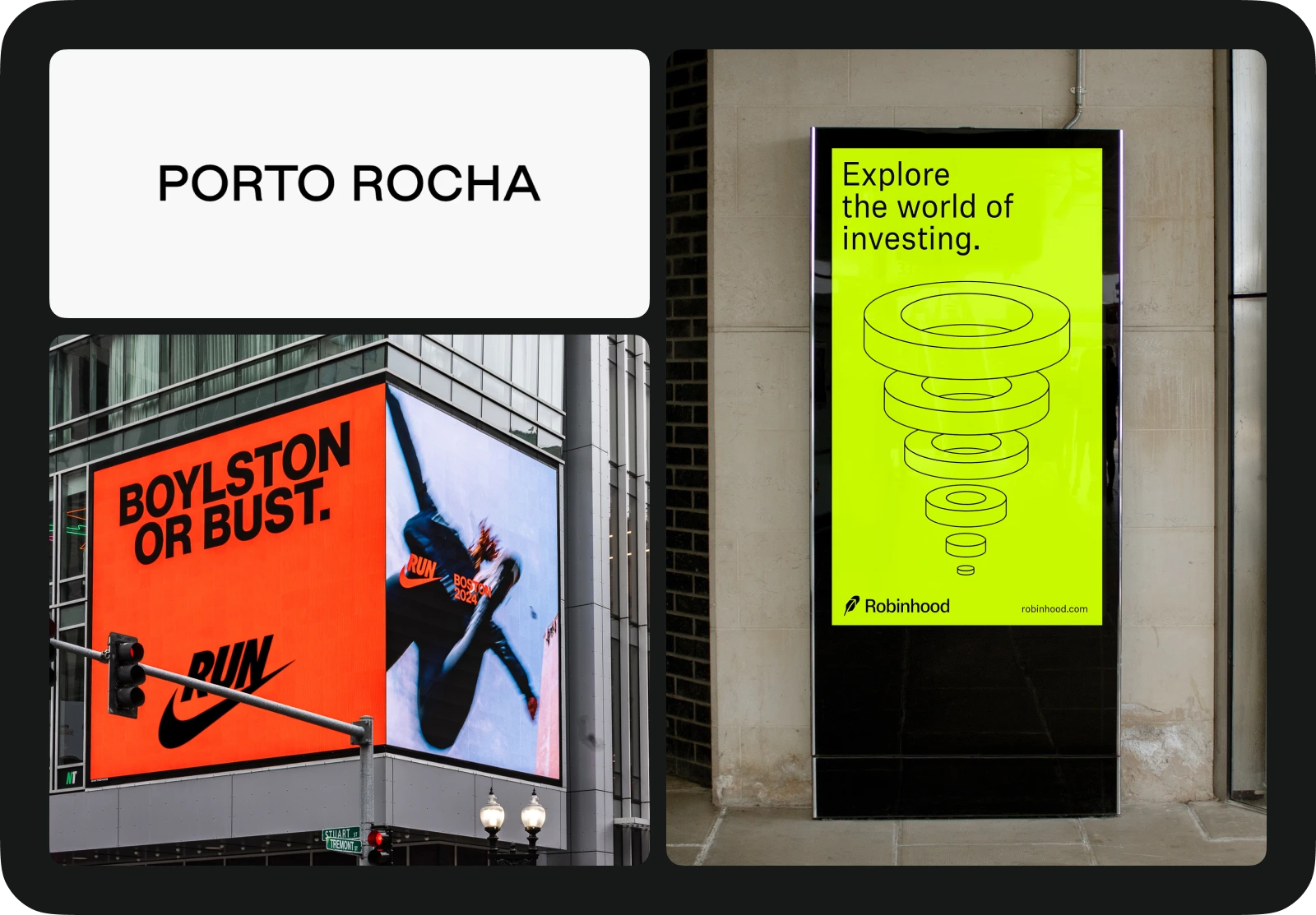
Their editorial and graphic design background makes their work especially strong on typography and storytelling. They’ve worked with startups and established companies looking for fresh creative perspectives and distinctive visual direction.
| Location(s) | New York City (NY, USA) |
| Founded | 2019 |
| Team Size | 10–49 |
| Clients | Startups, SMBs, Enterprises |
| Services | Brand Strategy, Visual Identity, Design Systems |
| Budgets | Undisclosed |
| Industries | Technology, Arts & Culture, Finance |
| Website | portorocha.com |
| Social Links |
- Best for: Global tech and retail companies, as well as independent artists and cultural institutions seeking work that is visually dynamic and culturally relevant.
- Downside: As a studio focused on design systems and cultural relevance, they may be less suitable for traditional, highly conservative corporate clients.
- Portfolio: Branding systems, products, and experiences for clients ranging from Snapchat and Airbnb (through founder's past work) to Sundance Film Festival.
- Strengths: Uniting strategy and design to create work that evolves with the world; seeking to provoke meaningful change through design.
- Unique Offering: Strong background in dynamic identity systems and the ability to craft branding for large tech and cultural brands while retaining a boutique, culturally-engaged studio sensibility.
8. C42D
C42D is a New York-based branding agency that builds compelling brands for early-stage companies. Its services encompass brand strategy, naming, identity design, and web development, aiming to help startups connect with audiences and inspire investors.
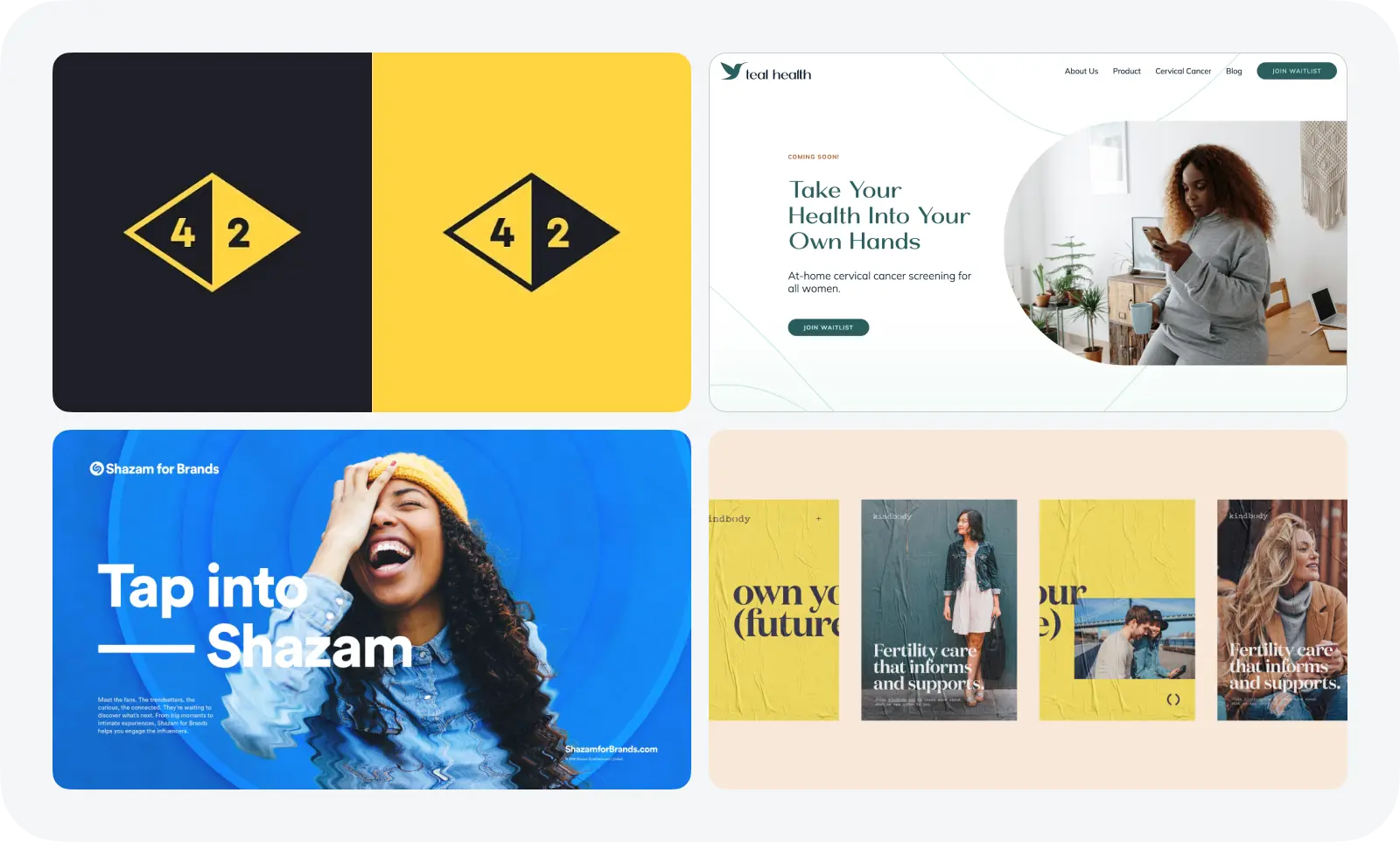
Focusing on detail and a collaborative approach, C42D guides clients through the branding process to uncover their unique value propositions. Their work is particularly noted in healthcare and venture capital sectors, where clear and engaging branding is crucial for growth.
- Best for: Early-stage tech startups (seed to Series D) and B2B enterprises that are "solving impossible problems, inventing the future."
- Downside: Higher pricing compared to some competitors; some non-business reviews mention internal/financial issues, though client reviews are overwhelmingly positive.
- Portfolio: Tech, AI, and healthcare startups and enterprises: Kindbody, Teal Health, Shazam for Brands.
- Strengths: Highly organized, responsive, and detailed; they are experts in positioning, brand strategy, and identity systems for early-stage companies.
- Unique Offering: "We Brand Unicorns": They specialize in craft brands and websites for startups that have raised over $1 Billion post-brand-launch.
9. BBDO
BBDO is one of the world’s most recognized creative agency networks, with branding at the core of many of its campaigns. Its strength is building brand narratives that fuel award-winning marketing campaigns and drive deep audience engagement. BBDO is known for emotionally intelligent work rooted in cultural relevance.
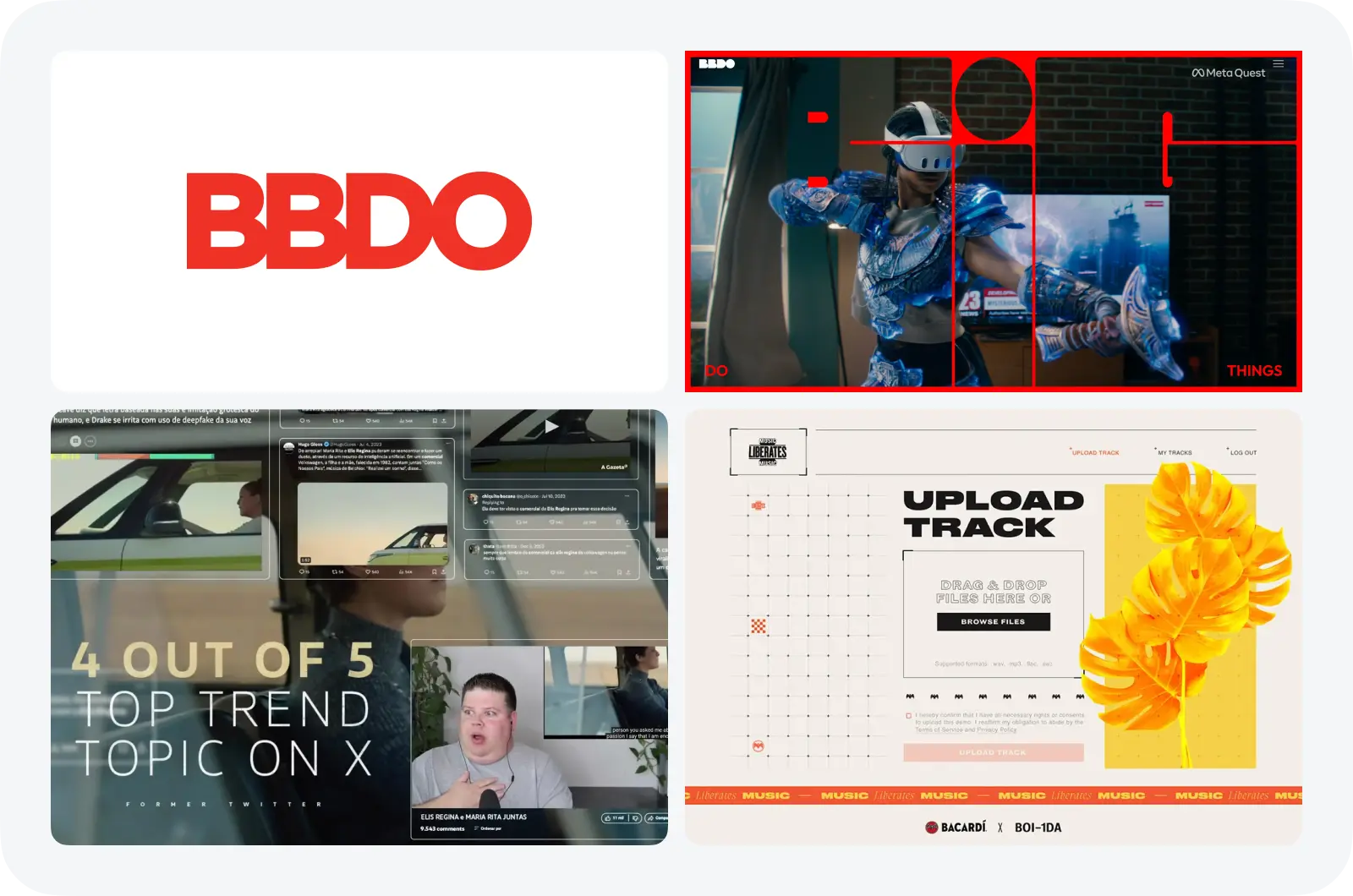
Though large, BBDO works on various brand strategy and messaging challenges, helping companies create identities that connect globally while feeling locally resonant. Their brand development process often includes film, digital, and experiential activations tightly tied to a central, strategic idea.
- Best for: Global corporations and large established brands seeking award-winning, high-impact creative campaigns rooted in deep consumer insights and data-driven strategy.
- Downside: Its traditional advertising roots mean it may lag in pure digital innovation compared to newer, specialized entrants; the large size can sometimes lead to siloed network offices.
- Portfolio: Global, industry-defining campaigns and branding: Snickers ('You're Not You When You're Hungry'), Pedigree, AT&T, Mars, Gillette.
- Strengths: Creative Effectiveness: Consistently ranked as the world's most creative and effective agency network (e.g., WARC Creative 100). Strong at using data and insights to validate the creative output.
- Unique Offering: "The Work, The Work, The Work" (long-standing mantra) and the newer philosophy to "Do Big Things." Focuses relentlessly on creating content that changes consumer behavior and drives financial reward.
10. 500 Designs
500 Designs is a California-based agency specializing in branding, website design, and UI/UX design. Founded and led by serial entrepreneurs, they partner with ambitious leaders to design better online businesses, define more innovative brand strategies, and innovate performance-driven products and services.
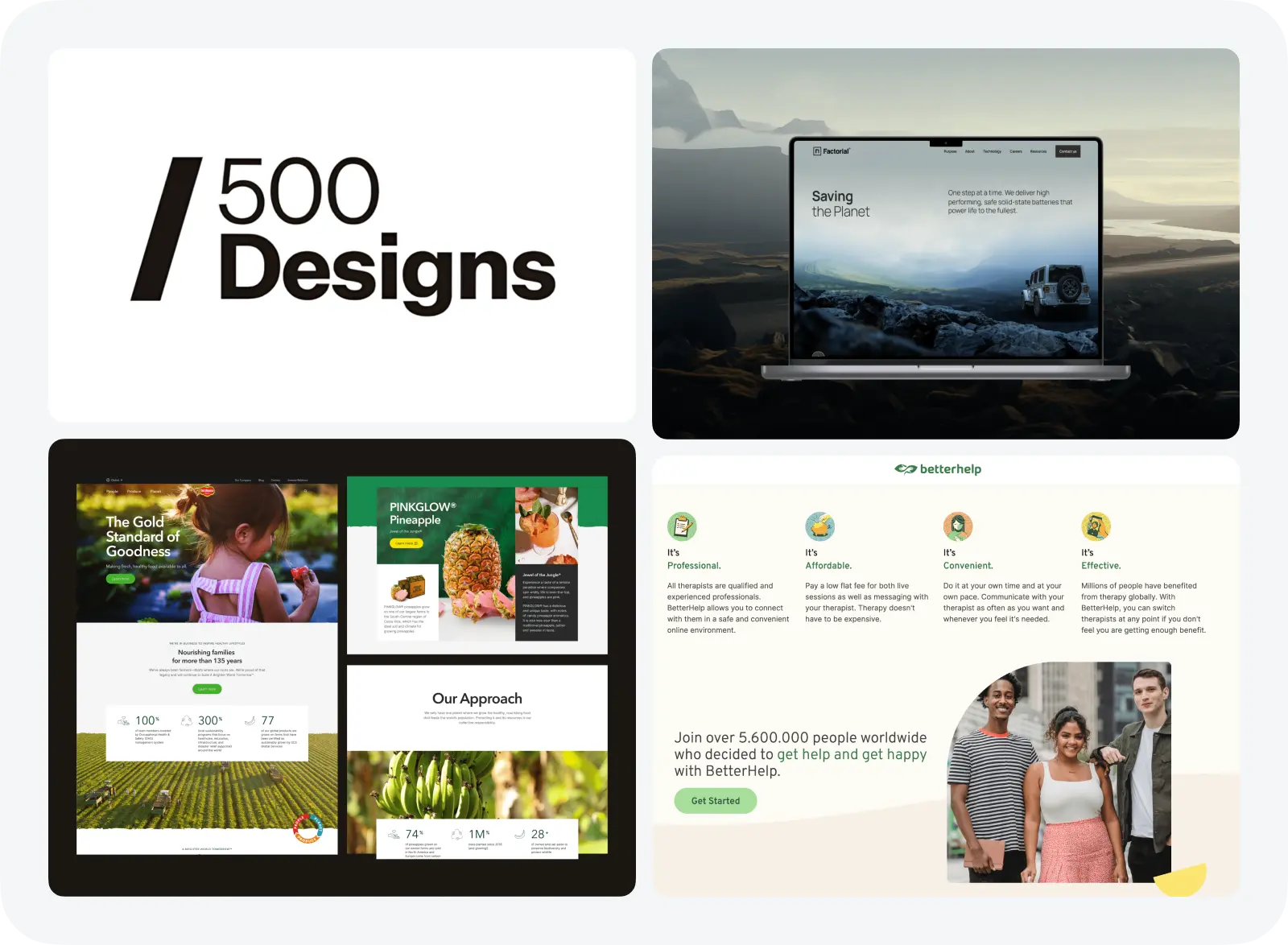
Their data-driven approach focuses on measurable outcomes and aligning design efforts with business goals. 500 Designs has been recognized for its high-quality design work across various projects, contributing to significant improvements in metrics such as website traffic, user engagement, and brand awareness for its clients.
| Location(s) | Irvine (CA, USA) |
| Founded | 2017 |
| Team Size | 50–249 |
| Clients | Startups, SMBs |
| Services | Branding, Web Design, Corporate Identity |
| Budgets | $50,000+ |
| Industries | Medical, Business Services, Financial, eCommerce |
| Website | 500designs.com |
| Social Links | LinkedIn, Facebook |
- Best for: Businesses needing integrated services: web design, mobile app design, and branding with a strong focus on high-quality digital execution and development.
- Downside: High pricing (starting at $100/hr, $50,000 minimum) can be a barrier for smaller projects; strategic work may be less emphasized than execution.
- Portfolio: Global brands in digital focus: Google, TikTok, FedEx.
- Strengths: Strong focus on high-quality UX design balanced with technical prowess; known for exceptional project management and communication skills.
- Unique Offering: Full-Service offering from branding strategies to development and marketing, focusing on achieving real strategic impact, not just cosmetic uplifts.
11. Ruckus
Ruckus is a full-service agency based in New York that creates strategic branding, platform design, and marketing campaigns. They partner with game-changing companies and global influencers to create work that drives consumer action and brand awareness.
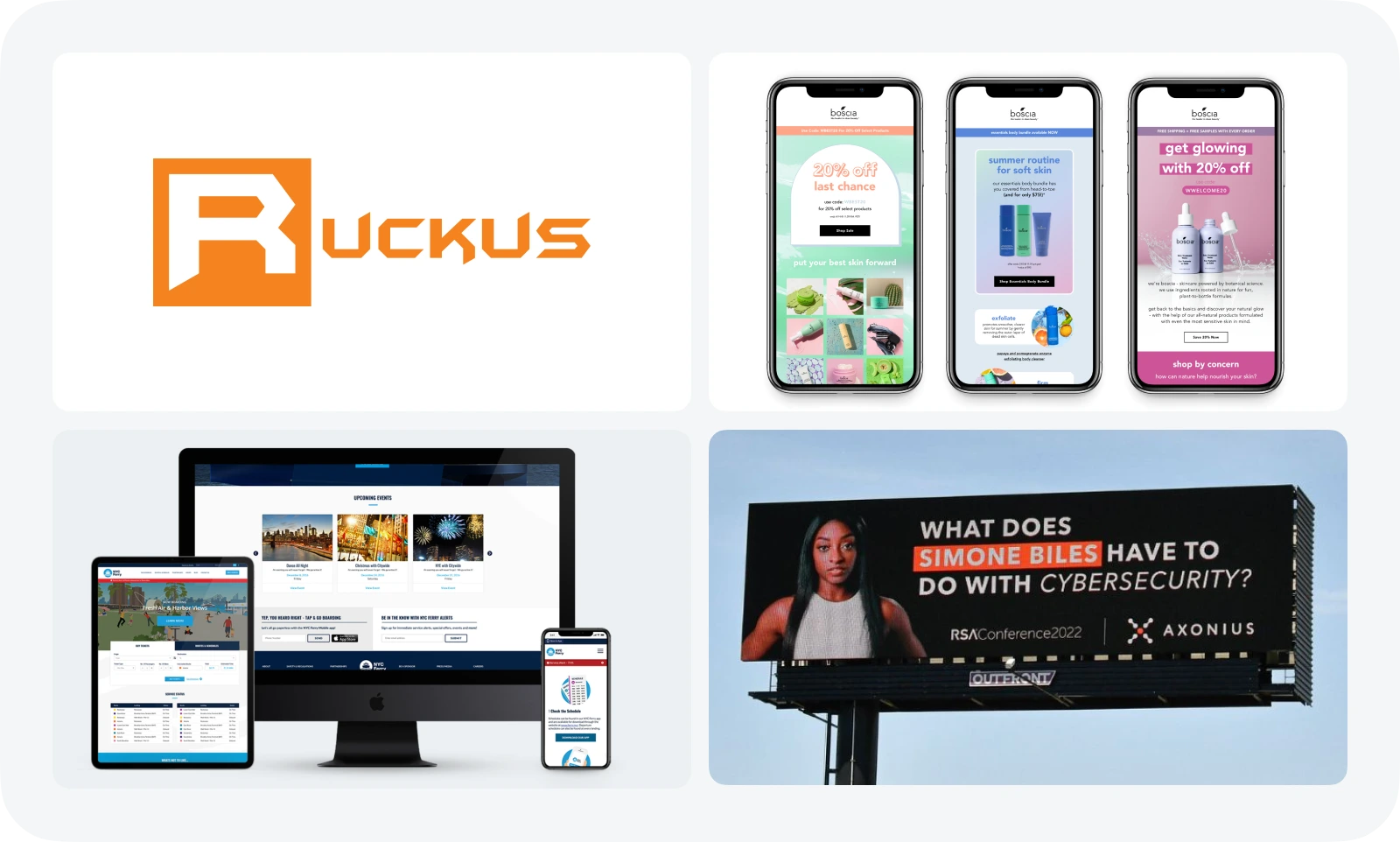
Their branding services are integrated with digital and marketing strategies, ensuring that brand identities are visually compelling and effectively communicated. Ruckus has a track record of successful projects and has been featured in prominent media outlets for its impactful work.
| Location(s) | New York City (NY, USA) |
| Founded | 2005 |
| Team Size | 10–49 |
| Clients | Startups, SMBs, Enterprise |
| Services | Branding, Platform Design, Marketing Campaigns |
| Budgets | $25,000+ |
| Industries | Retail, Consumer Goods, Automotive, Healthcare |
| Website | ruckusmarketing.com |
| Social Links | LinkedIn, Twitter |
- Best for: Companies needing integrated services across branding, platform design, campaigns, and content creation to drive measurable outcomes and awareness.
- Downside: Less focused on deep, long-term corporate brand strategy, and more oriented toward marketing execution and immediate campaign results.
- Portfolio: Diverse clients, often focused on campaign-driven work: Chrono24, Mobileye (CES disruption), Beekman 1802, BMW.
- Strengths: Business-minded agency with creative powerhouse; delivers work that powers game-changing companies and consistently drives desired outcomes.
- Unique Offering: Disruption is in their DNA and focus on creating high-impact, disruptive campaigns and content that catapults brand efforts domestically and globally.
What Branding Actually Is?
In B2B and SaaS, branding is is the operating system for how you are understood, remembered, and trusted by the market.
A modern brand connects three layers at once.
First, positioning: the space you choose to occupy in your category and the way you frame alternatives.
Second, story and messaging: how you articulate value to buyers, users, partners, investors, and candidates in language they recognize as their own.
Third, identity and experience: how that story shows up visually and verbally across the website, product, sales materials, onboarding, and campaigns.
When those three layers reinforce each other, your brand becomes a decision-making tool. It helps your team say “no” to distractions, stay consistent under pressure, and move faster without reinventing copy and design for every new initiative.
What branding is not?
Branding is often confused with a set of cosmetic tasks. A new logo before a funding announcement, a prettier homepage, or a moodboard for the next campaign can be useful, but they are not a brand.
Branding is not a one-off visual refresh with no impact on your sales narrative, pricing story, or product experience. It is not a pile of static guidelines that nobody opens after launch. And it is not a shortcut to fix weak product–market fit, unclear pricing, or broken retention.
If you treat branding as surface-level design, you get surface-level impact. The agencies worth working with will insist on connecting aesthetics to strategy, metrics, and day-to-day execution.
How to Choose a Branding Agency?
In high-growth tech industry branding is an item that moves revenue. Bad branding compounds into lower trust, weaker funnels, and higher CAC. Multiple studies from Lucidpress/Marq show that consistent brand presentation across platforms can increase revenue by roughly 23%. That’s the difference between “brand polish” and a genuine commercial advantage.
Rebranding, or building a brand from scratch hepls to align your story, product, and go-to-market around a clear, differentiated position. Choosing the right branding agency is a strategic investment decision.
Step 1: Audit your brand before you start
Before you type “best branding agency” into Google or AI agent, look inward. The more clarity you have, the better the agencies you’ll attract and the more efficient your process will be.
Clarify your “Why?”. Are you:
- pivoting your positioning,
- launching a new product,
- consolidating fragmented sub-brands, or
- repairing trust after performance, regulatory, or PR issues?
Each scenario demands a different brand strategy and scope. A crypto protocol moving up-market towards institutions, for example, will need a very different brand than a consumer-facing DeFi app.
Define your scope triangle. Be explicit about your constraints:
- Budget: What is the real range you’re prepared to invest, not just “see numbers”?
- Timeline: Are you tied to a funding announcement, roadmap milestone, or event?
- Quality: Are you looking for a foundational system you’ll use for 5+ years, or a faster, pragmatic refresh?
You can flex two of these; the third will move. Being honest about that trade-off helps agencies propose realistic approaches.
Align your stakeholders. Get internal agreement on:
- Business objectives (e.g., “shorten sales cycles with enterprise buyers,” “reduce token skepticism among institutions”).
- The problem you believe branding will solve.
- Who has final approval and how decisions will be made.
An alignment workshop now will save weeks of churn later.
The cost of doing nothing
Choosing not to act on a misaligned brand is rarely neutral. In B2B and SaaS, the cost simply shows up in less visible places.
You pay for it in higher CAC, because performance channels have to work harder to compensate for weak trust and unclear positioning. You pay for it in longer sales cycles, because buyers need more calls, more stakeholders, and more proof before they feel comfortable making a decision. You pay for it in lost deals at the very end of the funnel, when a better-packaged competitor feels like a safer bet to a risk-averse committee.
Internally, you pay for it in fragmented execution: marketing, sales, and product teams each tell their own version of the story, recreate assets from scratch, and improvise messaging under pressure. Over time, that fragmentation compounds. A rebrand, done well, is a way to systematically remove that friction.
Step 2: Search the market and build a shortlist
Once you know what you need, you can decide who you need.
Generalist vs. specialist
If you’re a diversified enterprise with multiple lines of business, a large network or integrated ad agency can be useful when you need brand, media, and campaigns tightly orchestrated at a global scale.
If you’re a VC-backed SaaS or crypto project moving fast, a specialist branding and product studio is often a better fit. You’ll get senior attention, tighter teams, and people used to working with incomplete information and compressed timelines.
The B2B/SaaS/Tech nuance
For complex categories: B2B, Fintech, Web3, SaaS, Cybersecurity, you need more than aesthetic talent. Your agency has to actually understand the domain: wallets, on-chain vs. off-chain, regulatory sensitivities, institutional vs. retail audiences, developer ecosystems, and so on.
Only few agencies specialize in exactly this intersection: translating complex B2B. SaaS and Web3 products into clear, trustworthy brands and digital experiences. That kind of partner can bridge the gap between protocol-level complexity and user-friendly design, rather than just “making things look cool.”
When you review potential partners, check whether they’ve:
- Worked with products as complex than yours.
- Shipped in your category (or adjacent ones, like Fintech, B2B, SaaS, Cybersecurity, AI).
- Created brands that still feel relevant several years later.
Build a shortlist of 3–5 agencies that clearly get your world.
Step 3: Vetting agencies like a Pro
This is where you move beyond portfolio thumbnails and case-study headlines.
Portfolio audit
Don’t just ask “Is this pretty?” Ask:
- What business problem were they solving?
- How did the new brand change perception, metrics, or sales motion?
- Did they solve for internal adoption: sales decks, product UI, docs, investor materials, or just a logo and homepage?
Push for specifics: improved close rates with enterprise prospects, higher activation, stronger community engagement, better conversion from waitlist to funded accounts, etc.
"Internal chemistry" and culture fit
You’ll be working closely with this team for months. Notice how they behave in early calls:
- Do they challenge your assumptions, or simply nod along?
- Do they ask sharp questions about your economics, governance, and roadmap?
- Do they seem comfortable with ambiguity, or do they rush to visuals?
Also confirm that the people you’re meeting will actually be the people doing the work—not just a pitch team that disappears when the contract is signed.
Red flags inside the proposal itself
Some warning signs only become obvious once you read the proposal.
- Deliverables are described in vague, generic language and it is hard to tell what you will actually receive at the end.
- There is no real discovery or research phase; the process jumps from kickoff straight into design.
- Collaboration is barely mentioned: no workshops, no checkpoints, no detail on how your stakeholders will be involved.
- The team is described in abstract terms—no clarity on who leads strategy, who leads design, and who will be hands-on day to day.
- There is no plan for rollout or handover, and no explanation of how your internal team will adopt and extend the work.
Step 4: Your selection criteria checklist
At this stage, you may have two or three strong candidates. Use clear, weighted criteria to compare them.
| Dimension | What to Look For | Questions to Ask |
|---|---|---|
| Hard Skills | Brand strategy, visual + verbal identity, UI/UX, motion, product thinking, experience in your category | “Show us a case where brand and product design worked together to improve a key metric.” |
| Track Record | Relevant clients (e.g., Fintech, B2B, SaaS), long-term brand performance, repeat engagements | “Which clients have you worked with for 2+ years, and why do they stay?” |
| Soft Skills | Communication style, pushback quality, ability to simplify complex topics, transparency under pressure | “Tell us about a time you disagreed with a client and how you navigated it.” |
| Culture Fit | Understanding of your stage and risk profile, respect for compliance/security, comfort with experimentation | “How do you adapt your process for a crypto/AI company vs. a traditional brand?” |
| Logistics | Time-zone overlap, meeting cadence, senior involvement, language, documentation quality | “Who is on our core team, and how many hours per week will they actually be on the project?” |
| Budget Fit | Clear scope, transparent pricing, options (phased or modular), no hidden add-ons | “If we needed to phase this over 2–3 quarters, how would you structure the work?” |
Use this grid in your internal debrief. It keeps the discussion grounded in outcomes and fit, not just who had the slickest case study.
The right branding agency should help you clarify your story, sharpen your positioning, and build trust with investors, customers, and community. In such industries like high-growth tech and B2B SaaS, that trust compounds.
Treat selection like what it is: a strategic partnership decision. Be clear on your “why,” strict in your evaluations, and honest about the trade-offs you’re willing to make.
Common Mistakes Companies Make When Choosing Branding Agency
It is easy to spot sloppy agencies. It is harder to notice the patterns on the client side that quietly undermine good projects.
One common mistake is over-weighting aesthetics. Teams fall in love with a portfolio that feels aspirational but never fully test whether the agency has moved sales, retention, or expansion for companies that look like theirs.
Another is under-scoping a complex shift: treating a category repositioning as a “logo and website” exercise, then being surprised when the sales narrative, enablement, and product UI still pull in different directions.
Price-driven decisions create their own traps. For a high-stakes rebrand, the cheapest proposal usually gets there by cutting senior time, research, or stakeholder work: the exact ingredients that de-risk the engagement.
Finally, many companies go into branding with no clear internal owner. Responsibility is spread across a committee, nobody is empowered to decide, and months are lost in circular feedback.
Avoiding these mistakes is as important as spotting issues on the agency side. The strongest partners in this space will be the ones who push you to be a better client.
How to Measure the Impact and ROI of Branding?
Branding is often described as hard to measure. In reality, for B2B and SaaS companies it affects exactly the metrics your board already cares about: you just need to be explicit about where you expect movement.
A useful starting point is to define a baseline a few months before you begin: how you are performing today on CAC, win rates by segment, sales cycle length, average contract value, net revenue retention, and inbound demand from your ideal accounts. You are trying to establish a “before” picture.
After the new brand is live on the website, in sales materials, in product UI where trust matters, look at four areas over the following 6–18 months.
At the top of the funnel, are you seeing more direct traffic, branded search, qualified inbound, and higher engagement from the right accounts?
In sales, are conversations more focused, cycles shorter, and win rates higher where the new narrative and materials are in play?
In product and customer health, do activation, expansion, and retention indicators improve as the experience becomes clearer and more consistent? On the talent side, does the story resonate with the candidates and employees you most want to keep?
A simple way to think about ROI is to ask a counterfactual question:
"If the rebrand helped you lift win rates by a few percentage points, shorten the sales cycle, or improve NRR even modestly, what would that be worth over the next 12–24 months?"
For most tech companies, the additional revenue from those movements dwarfs the cost of a thoughtful branding engagement. The right agency will be comfortable framing their work in that language.
What Your First Weeks With a Branding Agency Look Like
Signing a contract is the easy part. The way the first weeks are structured will largely determine whether the project gives you a genuine strategic step-change or just nicer slides.
Most strong agencies start with a focused kickoff and a series of stakeholder conversations. They will speak with founders, sales leaders, product, customer success, and sometimes key customers to understand not just what you sell, but how decisions are made and where deals stall.
In parallel, they will audit your current materials: website, product, decks, sales scripts, customer communications and map how your story and experience land today.
From there, the work shifts into strategy framing and the creation of a brand platform. This is where positioning, audience insights, and narrative themes are shaped into something concrete enough to guide decisions.
Often, this happens through a workshop where leaders see the same landscape of options and trade-offs for the first time. Only after that foundation is in place do you typically see early creative territories: a small number of distinct directions for how the new brand could look and feel, always anchored back to the strategy rather than taste.
By the end of the first four to six weeks, you should be able to trace a clean line from business objectives to brand strategy to first creative hypotheses. If that through-line is missing, it is usually a signal to slow down and realign before moving into full execution.
Typical Deliverables From Branding Project
Different agencies package their work differently, but for a serious B2B/SaaS rebrand you should expect most of the following to be covered:
- Brand strategy and platform:A clear articulation of positioning, differentiation, audience insights, and brand pillars, captured in a strategic document your leadership team can actually use to make decisions.
- Verbal identity and messaging: A core story for the company, key messages for your main segments or use cases, and practical voice and tone guidance with examples of what “on brand” communication looks and sounds like.
- Visual identity system: A logo system, typography, color decisions, and layout principles designed to scale across website, product, decks, and campaigns, rather than a single static “hero” execution.
- Product and digital design foundations: Priority page designs for your website and a set of UI components or a lightweight design system (often in Figma) so product and marketing teams are not starting from a blank canvas.
- Implementation assets and guidelines: Ready-to-use sales and investor decks, one-pagers, basic campaign or social templates, and brand guidelines that explain how everything fits together and how your in-house team should work with it.
The value is less in the number of files and more in how usable these deliverables are for the people who will be working with them every week after the agency engagement formally ends.
In-House vs Freelancer vs Branding Agency: What’s Right for You?
Before you commit to a branding agency, it helps to be honest about what kind of partner you actually need.
An in-house brand or marketing team works best when there is a continuous flow of work: product launches, campaigns, sales enablement, recruitment marketing. The strength of in-house is proximity. Your people understand internal constraints, know the product roadmap, and can iterate in lockstep with product and growth. The trade-off is that it is hard to build and retain the kind of senior, cross-disciplinary brand team that a complex repositioning requires.
Freelancers and solo specialists are a good answer for narrow, well-defined problems. If you need a pitch deck that actually converts, a pragmatic identity refresh, or design support for a specific launch, a strong individual contributor can be extremely effective, especially if you already have a clear strategy and just need execution. What they typically cannot provide is the combination of research, stakeholder alignment, and organizational change needed for a step-change rebrand.
A branding agency or brand/product studio makes the most sense when you are facing an inflection point: moving upmarket, entering a new category, consolidating multiple products into a coherent platform, or correcting years of brand drift. In those moments, you are buying pattern recognition across dozens of similar journeys, structured strategy work, and a team that can connect positioning, narrative, identity, and product experience into one system.
When you’re not ready for a full-Scale rebrand
There are also moments when the most strategic move is to wait.
If you do not yet have clarity on your ideal customer profile or buying committee, if your pricing model and packaging are still changing every quarter, or if your leadership team cannot agree on the basic direction of the business, a full-scale rebrand is likely premature. The risk is that you pay for a beautiful story that needs to be rewritten six months later.
In those cases, lighter interventions are usually a better fit: a focused positioning or messaging sprint, founder-story work for fundraising, or a pragmatic identity clean-up that removes the worst friction without locking you into a long-term system too early.
Conclusion
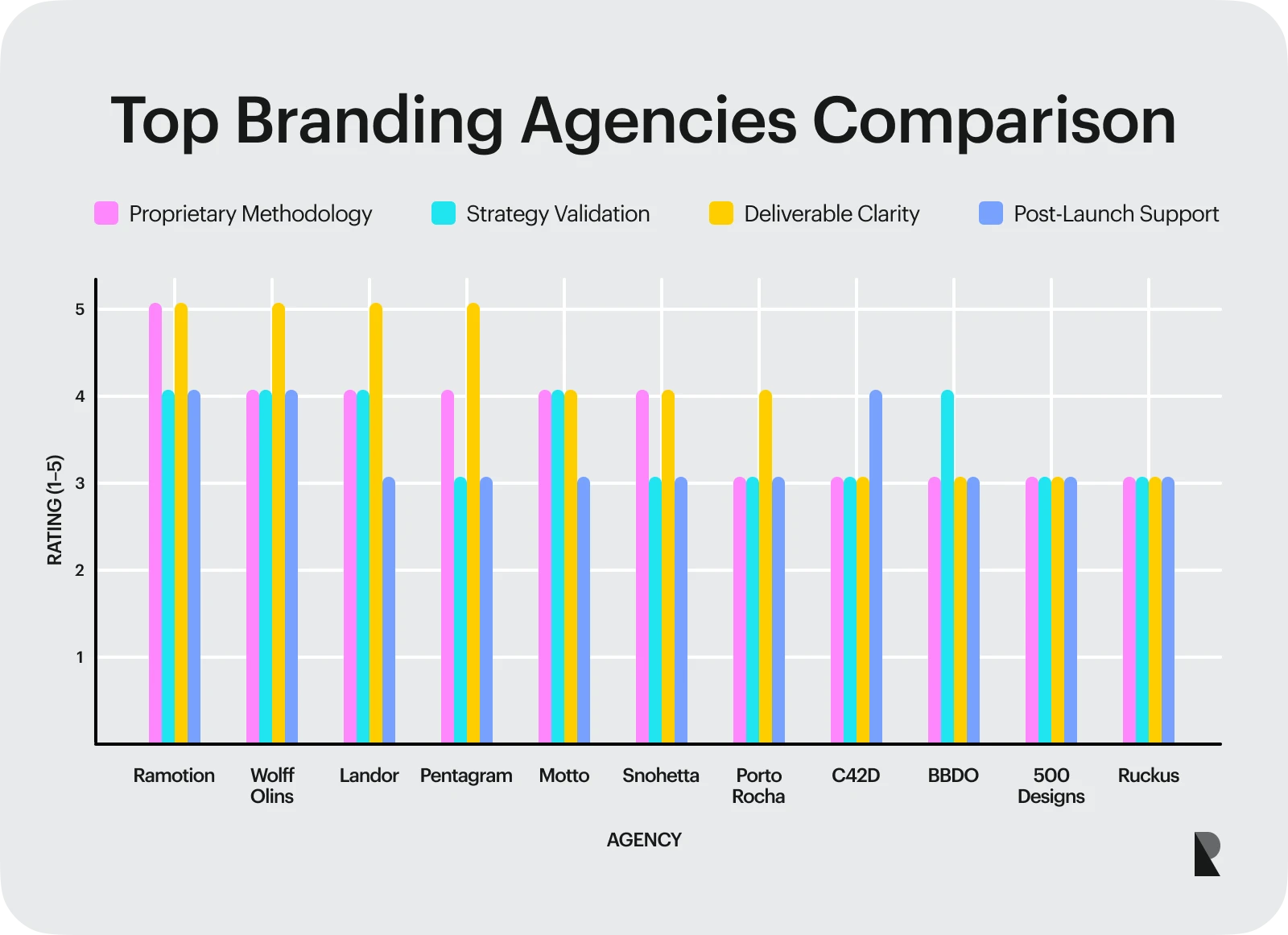
The comparison chart highlights the performance of leading branding agencies across four key criteria: proprietary methodology, strategy validation, deliverable clarity, and post-launch support. Ramotion, Wolff Olins, and Landor consistently rank at the top, showcasing exceptional performance in all categories, particularly in deliverable clarity, where they achieved perfect scores. This consistency reflects their strong strategic frameworks and ability to deliver precise, high-quality results aligned with client expectations.
Agencies such as Pentagram and Motto demonstrate strong methodology and delivery but slightly lower scores in strategy validation and post-launch support, suggesting that while their creative output is strong, ongoing client engagement may offer room for improvement.
On the other hand, emerging firms like Porto Rocha, C42D, and Ruckus maintain solid, balanced scores across categories, highlighting reliable performance without significant weaknesses.
The data underscores that top-tier agencies distinguish themselves through clarity and methodology, key drivers of brand success. Firms like Ramotion and Wolff Olins set the benchmark by combining structured processes with strategic insight and strong client support. These insights can guide businesses in choosing partners that best align with their branding goals—whether prioritizing innovation, reliability, or long-term collaboration.
And the impact of branding on long-term business success is hard to overstate. Brands that maintain consistency across all platforms see up to 33% higher revenue. That’s not a design detail — it’s a performance driver. Whether you’re repositioning for a new market or launching something from scratch, your chosen agency should understand your brand and help shape what it could become.
Great branding creates experiences that are just as memorable as they are meaningful. It gives you the foundation to communicate your core values, speak to your target audience, and appear clearly and confidently across digital marketing and physical touchpoints. If you're ready to build a brand that sticks, let’s talk.
FAQ
-
What does a branding agency do?
A branding agency shapes how your company looks, sounds, and feels: from strategy and messaging to design and identity. They help you connect with your audience through a consistent, memorable brand experience.
-
How do I choose the best branding agency for my business?
Look for an agency with relevant experience, strong case studies, and a strategic approach. Make sure they understand your goals and feel like a long-term partner, not just a design vendor.
-
How branding agencies price their work?
1. Time-based pricing
The traditional model where work is billed hourly or daily. It is transparent but requires discipline in managing time and scope.
2. Fixed-price pricing
A set price for a defined scope such as brand strategy, identity design, or brand guidelines. The client knows the total cost upfront while the agency controls project boundaries.
3. Retainers or value-based agreements
Ongoing partnerships where payment depends on the value created, for example improved brand awareness or sales growth.
European vs. American branding agency pricing in 2025
European agencies more often use retainer models focused on long-term strategy and brand governance. American agencies tend to prefer project-based pricing with clear deliverables and faster turnaround. Average hourly rates remain higher in the United States (around $150–250) compared with Europe (€100–180), though the gap is narrowing as hybrid and remote collaboration becomes standard.
-
How long does a branding project usually take?
Simple identity projects take about 1–2 months. Full-scale branding, including strategy and rollout. usually takes 3–6 months, sometimes in phased stages.
Those timelines describe the work itself. The impact follows with a small lag. Most teams start to notice early signals: clearer sales conversations, more qualified inbound, stronger reactions to the storywithin a few months of rollout. The full commercial effect typically plays out over six to eighteen months as the new brand is embedded into your website, product, marketing, and sales enablement.
-
What should I prepare before hiring a branding agency?
Gather your current brand assets, clarify your business goals, and define what success looks like. The more context you bring, the better your agency can deliver.
-
What red flags to watch out for when hiring a branding agency?
Be cautious if an agency focuses only on visuals without connecting branding to business goals. Lack of process transparency is another warning sign. A strong agency explains its methods, from research to brand guidelines.
Portfolios that show designs without context or results make it hard to judge expertise. A generic approach suggests weak strategic thinking. Poor communication during briefing usually predicts disappointing outcomes.
-
Who owns the branding work and source files when the project ends?
IP and ownership are easy to overlook and painful to fix later. In most branding projects, you should expect to own the final brand assets and source files: logos, design systems, templates, and copy once the final invoice is paid.
Agencies may keep rights to unused concepts, internal tools, and process artifacts, and some elements such as fonts or stock photography might require separate licenses in your company’s name.
If anything is unclear, ask the agency to spell it out in the contract: who owns what at each stage, when ownership transfers, and how your in-house team is allowed to adapt and extend the work over time.
May 16, 2025
